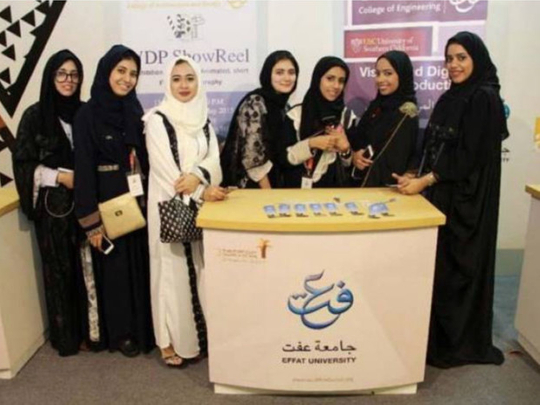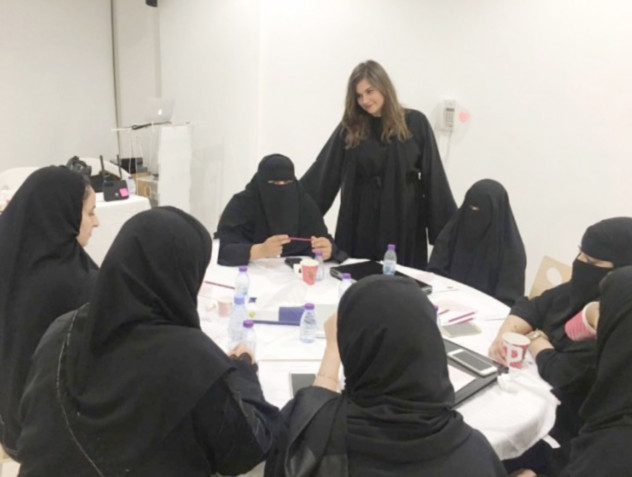
Jeddah: When Bushra Al Andijani was a young girl she watched on television a pair of star-crossed lovers jump from the stern of a big boat into cinematic history.
“Jack”, the lead character, didn’t survive the icy Atlantic, but “Titanic” gave birth to Al Andijani’s lifelong dream to create something out of nothing.
“Since I was little and saw “Titanic” I was really moved that everything looked so real,” Al Andijani told Gulf News. “I want to create something realistic like in “Avatar” or “Lord of the Rings.”
Al Andijani will be among the Class of 2017 to graduate in the spring with a Bachelor’s degree in studies of visual and digital production from the Jeddah-based all-women’s Effat University in Saudi Arabia. She belongs to an exclusive membership: the first generation of Saudi university-trained female filmmakers.
It might be a shopworn expression to characterise Al Andijani and her classmates as trailblazing pioneers, but in a culture that generally remains committed to young women marrying first and consider a career second, Al Andijani represents a new breed of filmmaker competing against her male counterparts for coveted studio jobs. A profession once unattainable, Saudi women see producing feature-length movies within their grasp.
Less than a decade ago Saudis were resigned to shooting and screening their films outside the Kingdom. Most filmmakers were amateurs with no academic training, although many cut their teeth producing YouTube videos. Other aspiring directors and writers left the country to attend film school and even remained in Hollywood to pursue their artistic vision.
Saudis developing a reputation for mature themes in movies include Mohammad Al-Turki, who served as executive producer of the Richard Gere vehicle, “Arbitrage,” and “99 Homes” featuring Michael Shannon.
Jeddah native Mahmoud Sabbagh, whose romantic comedy film “Barakah Meets Barakah”, will represent Saudi Arabia in the Best Foreign-Language Film category at the 2017 Academy Awards. It also won the Prize of the Ecumenical Jury at the 66th Berlin Film Festival.
Al Andijani, who is studying CGI (computer-generated imagery) animation since starting the programme in 2014, has witnessed opportunities expand for young people with the skills and drive. She recently returned from Springfield, Missouri, where she spent a semester studying CGI at Missouri State University.
“When I was in high school I started looking at my options. I went to Effat to be an architect, but then I saw the animation program I definitely wanted to go there,” said the 20-year-old Al Andijani, who hopes to pursue a master’s degree and perhaps work for DreamWorks or Pixar. “I had to convince my parents; they were a little bit worried because three years ago there was no clear idea of whether there were jobs.”
If students’ interest in the curriculum at Effat is any indication, most filmmakers will make their way into film production. Dr Mohammad Ghazala, author of the book “Animation in the Arab World” and assistant professor and chair of Effat’s Visual and Digital Production Department, said 60 per cent of the students focus on live-action film production, 30 per cent on animation and about 10 per cent in screenwriting. Video game-making is another discipline that is emerging, he added.
Effat’s programme has four tracks: animation, film production, screenwriting and interactive media. It started with 16 students and has since mushroomed to 130.
But aspiring Saudi women filmmakers are an independent bunch.
While Ghazala estimates that about 30 per cent of his students will find employment in commercial studios, many will create their own jobs.
“They have their own stories outside the class and do their own projects,” he said. “The market in this country is hungry. Skilful professionals are expensive, but they are not all that skilful. But our students have the skills and the energy.”
The difficult path to obtaining experience to produce movies has much more to do with the practicalities and expense of filmmaking rather than government or cultural roadblocks. Effat students during the first year of the programme scrambled for whatever equipment was available, which was not much. Today, the department has 30 cameras and the necessary lighting and sound equipment to complete their work.
Ghazala said the Saudi government has paved the way for young filmmakers to establish themselves.
“There are a lot of opportunities for the new generation and they are giving a lot of support to filmmakers,” Ghazala said. “Before there was not much accreditation or support, but now we receive permission from authorities to shoot outside.”
Asem Al-Roumi, a Saudi filmmaker who owns Asem Films and is a graduate of the New York Film Academy, said government support, particularly with the collaboration between the Ministry of Culture and Information and the Saudi Arabian Society for Culture and the Arts, is critical to the success of local artists. The Saudi Film Festival held earlier this year in Dammam is a prime example.
“We got a [great] deal of government support,” Al-Roumi said. “The government support took shape by allowing us to go public.”
The extent of the Saudi government’s commitment to furthering the development of the country’s nascent film industry is evident in its recruitment of the New York Film Academy to conduct workshops at the King Saud University in Riyadh. Earlier this year NYFA instructors helped young Saudis make short films that offered intimate glimpses into Saudi culture.
“The New York Film Academy has been the academic institution of choice to numerous students from Saudi Arabia, many of whom have returned to their country and are deeply attached to the Kingdom’s blossoming creative community,” NYFA President Michael Young said in a statement.
Ghazala said young Saudis are eager to practice their craft in Saudi Arabia because they understand the mood of the country and respect its heritage and identity. He noted that Saudi Arabia possesses the necessary elements for good storytelling.
“When I was in Switzerland I asked someone why there was no filmmaking there and I was told, ‘we have an easy life and don’t have the drama,’ ” Ghazala said. “Countries must have some challenges (to produce good films) and I believe that Saudi Arabia will be the new hub for filmmaking.”
-Rob L. Wagner is a freelance journalist based in Jeddah













